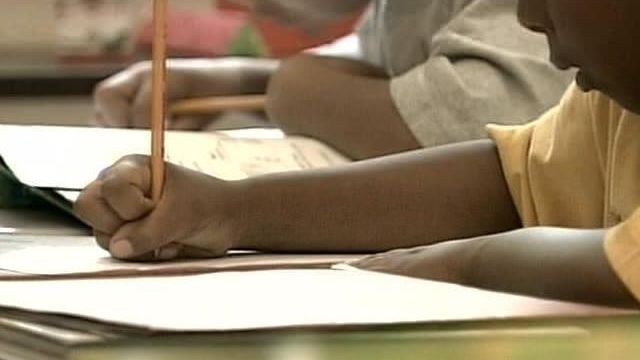Report: N.C. Charter Schools Need Improvement, More Diversity
North Carolina's 100-school cap on charter schools should remain in place, at least until student performance improves and the schools are more racially integrated, a nonpartisan organization said Wednesday.
Posted — UpdatedIn examining data from the alternate public schools that first opened 10 years ago this fall, the North Carolina Center for Public Policy Research also said financial troubles at some schools remain worrisome and that their innovative curricula have failed to carry over to traditional schools.
"When we looked at 10 years' worth of data on all the charter schools, that's when we found that 53 percent of them were finishing in those bottom three categories on academic performance under the state ABC accountability testing system," said Ran Coble, the center's director. "Because most of them are doing not as well as traditional public schools, it's a reason to slow down and say, 'Don't expand the experiment before you've got something that works.'"
The report likely will build confidence among education groups skeptical of charter schools, which are run by private boards and administrators and don't have to follow all the regulations imposed on traditional public schools. They receive roughly $200 million in public money annually and don't charge tuition.
House and Senate bills that were filed this year to eliminate the 100-school cap have gone nowhere. The state budget that the House passed would permit the Department of Public Instruction to study whether the schools have met goals set by initial legislation approved in 1996. The budget is in negotiations between the House and Senate.
"We were hoping that this experiment would reap innovative trends that would be good for (traditional) schools," said Eddie Davis, president of the North Carolina Association of Educators. "We just have not seen very much of that."
But Tom Humble, principal of Raleigh Charter High School, said the report "ignores the complexity of what charter schools are doing."
Charter school supporters have said the cap needs to be lifted because thousands of children are on waiting lists to attend. They also argue that many students who don't make the grade in traditional schools benefit from the intimate environment charters usually bring.
"Predictably, the report does not address the growing demand for charter schools," said Terry Stoops, an education policy analyst at the conservative-leaning John Locke Foundation in Raleigh. "Poll after poll shows that a majority of North Carolinians want more charter schools."
"It really is pretty silly to me to not raise the cap. We've got a waiting list trying to get into charter schools," said state Sen. Neal Hunt, R-Wake, who is sponsoring one of seven bills pending in the General Assembly that would raise or remove the cap.
"That's the market research that ought to be considered by the General Assembly, that the parents like what's going on," Humble said.
A similar 2002 study by the center also said the cap should remain, in part because there wasn't enough information on student test scores to make a judgment.
The new report, however, found that charter schools performed about the same or slightly worse than traditional schools on student test scores and high school graduation rates.
During the 2005-06 school year, for example, 53 percent of the charter schools were either labeled as failing to attain the academic progress expected of them or fell into the worst categories on end-of-year tests, compared with 48 percent for all public schools.
According to the report, four Wake County charter schools -- Quest Academy, Magellan Charter School, Exploris School and Raleigh Charter High -- were listed among the highest-performing schools in the state.
But three other local schools -- Torchlight Academy, Baker Charter High School and SPARC Academy -- were among the lowest-performing charter schools statewide.
Officials with Torchlight Academy and SPARC Academy couldn't be reached for comment Wednesday. Baker Charter High, which served students in the Wake County Jail, had its charter revoked last year after an investigation showed the school excluded eligible students and failed to keep accurate attendance records.
The report recommended that schools not meeting expected academic growth for five straight years be placed on probation for two years, then closed if they don't reach it. Charter school leaders have said many students who wind up in their schools perform poorly academically and can't excel on standardized scores overnight.
Charter schools also don't appear to "reasonably reflect the racial and ethnic composition" of the school districts where they are, the report said.
While North Carolina's population is almost 22 percent black, 39 of the 99 charter schools during 2005-06 had a nonwhite population that exceeded 50 percent. The student population at 14 of the schools was more than 95 percent black, the report said.
Jack Moyer, director of the North Carolina Office of Charter Schools, said the law allows racial composition to reflect "the special population that the school seeks to serve." Some schools have focused their attention on helping black students, he said.
"I wish there was more diversity," Moyer said in an interview, but "I truly believe that they're working at it."
Moyer also said ethnic and racial makeup within the overall charter school student population is largely in line with the student population in the rest of North Carolina's public schools.
The report also urged the State Board of Education to grant future charters in counties that don't have any now. Wake County has 14 of the 93 charter schools currently in operation.
• Credits
Copyright 2024 by WRAL.com and the Associated Press. All rights reserved. This material may not be published, broadcast, rewritten or redistributed.





